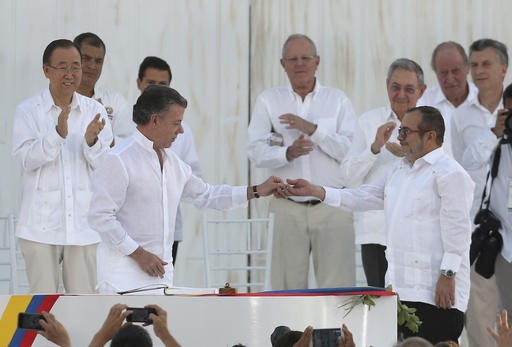Popular Reads
Top Results
Can't find what you're looking for?
View all search resultsPopular Reads
Top Results
Can't find what you're looking for?
View all search resultsWith less fervor, Colombia takes another stab at peace
Change text size
Gift Premium Articles
to Anyone
 Colombia's President Juan Manuel Santos (front left) gives a peace pin to the top commander of the Revolutionary Armed Forces of Colombia, FARC, Rodrigo Londono, known by the alias Timochenko after they signed a peace agreement between the government and the FARC in Cartagena, Colombia, Sept. 26, 2016. (AP/Fernando Vergara)
Colombia's President Juan Manuel Santos (front left) gives a peace pin to the top commander of the Revolutionary Armed Forces of Colombia, FARC, Rodrigo Londono, known by the alias Timochenko after they signed a peace agreement between the government and the FARC in Cartagena, Colombia, Sept. 26, 2016. (AP/Fernando Vergara)
W
ith less fervor and an added dose of uncertainty Colombia's government on Thursday will sign another peace accord with the country's largest rebel group — the second in two months.
The simple, hastily-organized ceremony in a Bogota theater reflects President Juan Manuel Santos' greater sense of urgency to end hostilities with the Revolutionary Armed Forces of Colombia after the original accord, brokered over four years of talks, suffered a shock defeat in a referendum a week after it was signed in front of heads of state and UN Secretary General Ban Ki-moon.
Santos, winner of this year's Nobel Peace Prize, has tried to project a conciliatory image in the face of the humbling defeat at the polls.
The new, 310-page accord introduces some 50 changes intended to assuage critics led by still-powerful former President Alvaro Uribe. They range from a prohibition on foreign magistrates judging FARC crimes to a commitment from the insurgents to forfeit assets, some of them amassed through drug trafficking, to help compensate their victims.
But the FARC wouldn't go along with the opposition's strongest demands — jail sentences for rebel leaders who committed atrocities and stricter limits on their future participation in politics.
In an act of protest, members of Uribe's political party are considering a boycott of next week's scheduled debate in congress on ratifying the agreement, accusing the legislature of disobeying the constitution. They're also threatening to call for street protests to denounce what they say is a "blow against democracy."
"The government preferred to impose itself in a way that divides Colombians instead of a national pact that would bring us together," Uribe's Democratic Center party said in a statement Wednesday.
The lack of broad support for the accord will make the already-steep challenge of implementing it even tougher.
Colombians overwhelmingly loathe the FARC for crimes such as kidnappings and drug-trafficking. Ensuring that the 8,000-plus fighters don't wind up joining criminal gangs rampant throughout the country, or the much-smaller National Liberation Army, will also test the state's ability to make its presence felt in traditionally-neglected rural areas at a time of financial stress triggered by low oil prices.
There's also a risk that peace could trigger more bloodshed, as it did following a previous peace process with the FARC in the 1980s when thousands of former guerrillas, labor activists and communist militants were gunned down by right-wing militias, sometimes in collaboration with state agents.
That fear, although less prevalent than in the darker days of Colombia's half-century conflict, has become more urgent with more than a dozen human rights defenders and land activists in areas dominated by the FARC being killed by unknown assailants since the first signing ceremony in September.
Santos this week held an emergency meeting with his Cabinet and UN officials to discuss the murders, taking an opportunity to reinforce his message that peace can't wait. So far this year, 70 have been killed, according to Bogota-based We Are Defenders, more than in all of 2015 and 2014.
"We have to take action. There's no time to lose," Santos said in a televised address announcing Thursday's ceremony with less than 40 hours of anticipation.
Once signed, Santos will introduce the accord to Congress, where a solid majority in support of peace is expected to ratify it as early as next week. Lawmakers will then embark on the nettlesome task of passing legislation so the guerrillas can begin concentrating in some 20-plus demobilization areas where they will begin turning over their weapons to United Nations-sponsored monitors.









